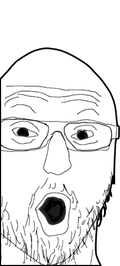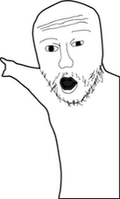

 ‘whataboutism!!!’
‘whataboutism!!!’ 


 ‘whataboutism!!!’
‘whataboutism!!!’ 
But what’s the significance?


He wants to know who the US president is.
IDGI


Explanation?


People are asking a lot of questions that are already answered by my ‘I wouldn’t eat a human’ shirt.


What’s the point of getting a PS5 or Xbox instead of a PC?


Do you not know who the other option is?
99% Biden. All the same policies, but without the decorum.


the other choice is the end of democracy
What ‘democracy’?
You never actually had any sort of representation of working-class people’s interests in your government, so clearly you aren’t talking about any genuine democracy.
And there is no indication that the practice of representative ‘democracy’ is going away under the 99% Biden option, so clearly you aren’t talking about that, either.
Also, if you do have a democracy, as you claim, then you should be put on Nuremberg trials for your complicity in many, many atrocities that you keep committing in a supposedly-democratic manner.
and a piece of human shit in office
Literally every single USian president, ever, including Biden. Hell, you venerate worse beings than Trump, like chattel slavers like Washington, for example.
Also, your plan seems to basically be ‘never have the Dem party, which literally funds and backs Republican candidates in elections (including Trump in 2016, by the way), lose a presidential election to the Rep party’. Every literate person understands that that is not workable, even if you were correct about the supposed ‘end of democracy’.


Synonyms for the word ‘Cassandra’ include ‘tankie’.


I’m being serious. The word ‘infinity’ refers to some points from spaces like Aleksandrov compactification. It does not refer to any sort of repetition of any pattern. You cannot, for example, write ‘0.999∞’ or ‘0.999infinity’ to mean the same thing as ‘0.999…’ or ‘0.(9)’.


Alright, so, the other proof that I promised:
If we define 0.999… as the sum of the series 9/10+9/100+9/1000+…, then for every neighbourhood U(1) it is true that there exists a metric ball B_N = B(1, 1/10^N), where N is natural, such that B_N is a subset of U(1).
For all natural n > N it is true that d(sum(9/10^k) for k from 1 to n, 1) = |1 - sum(9/10^k) for k from 1 to n| = |1/10^n| = 1/10^n < 1/10^N, meaning that for all natural n > N it is true that sum(9/10^k) for k from 1 to n is in B_N, meaning that it is also in U(1).
However, sum(9/10^k) for k from 1 to n is the nth partial sum of the series 9/10+9/100+9/1000+…, which, together with the fact that every such sum is in U(1) for n > N, means that 1 is the limit of the sequence of the partial sums of the series 9/10+9/100+9/1000+…, meaning that 1 is the sum of that series. That means that 0.999… is 1 by definition.


Thank you.
And no, I do not notice any errors.
I should re-learn Lateχ.


The ellipses mean infinity
No, it does not. The ellipsis notation is used to denote a repeating pattern. It is not used to denote points that are named ‘infinity’ in spaces like Aleksandrov compactification and the extended space of real numbers.
I am sorry, but your reply lacks rigour.


The symbol ‘i’ is usually reserved for the imaginary unit.


Just to be specific, as what a particular sequence converges to depends on the topology of the space where we are looking for a limit of the sequence. Hell, in non-Hausdorff spaces a sequence can have multiple limits (trivial case: anti-discrete space of cardinality greater than 1 will have every sequence converge to every point in it).


Turns out, dragons are kind of cool.


I am going to note that this was not well-expressed when you said ‘we can just pretend to have “reached infinity” and work with like any number’. To a lay person it would look as if you were suggesting that we non-rigorously treat one object (like the sequence (0.9, 0.99, 0.999,…)) as another (like the real number that that sequence converges to given the standard topology of the space of real numbers).
Have you heard the tale of Dark Brandon the Wise?